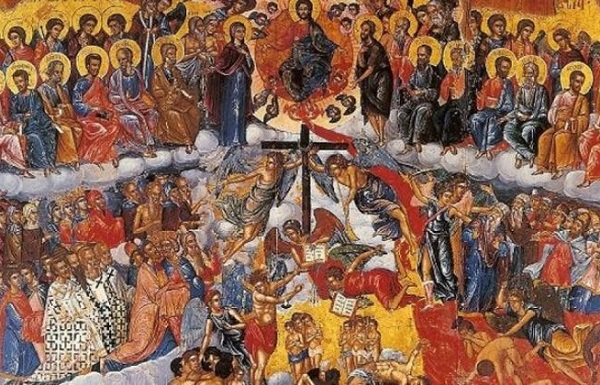On Meat-Fare Sunday (1)
8 March 20211. Last Sunday, the Church commemorated the indescribable loving-kindness of God towards us, as presented in the parable of the saved Prodigal. This Sunday, it teaches about the future, most dreadful judgement of God, following a proper order and paying attention to the voices of the prophets: ‘I will sing to you, Lord, of mercy and judgement’ [Ps. 101, 1]; and ‘God has spoken once and I have heard these two things: that dominion is God’s and that mercy is yours, Lord. For you will recompense people according to their works’ [Ps. 62. 11-12].

2. So mercy and long-suffering precede divine judgement. God is distinguished by having and containing all the virtues, while, at the same time, he is just and merciful. Since mercy is not compatible with judgement,- as it is written ‘You shall not be merciful to the poor at judgement [see Proverbs 24, 23: ‘it is not good to have respect for persons in judgement’]- God naturally appointed a proper time to each, allotting the present to forbearance and the future to recompense. The Holy Spirit has ordered the rites of the Church in such a way that, when we realize that we receive forgiveness of sins from what happens here and now, we may make haste, while still in this present life, to achieve everlasting mercy and to deserve God’s loving-kindness. Because that judgement is merciless for the unmerciful.
3. Therefore, having recently spoken regarding God’s love for us, we shall today speak of Christ’s Second Coming: the dread judgment itself and what will happen in a mysterious fashion- things which the eye has not seen, nor the ear heard, nether having entered into people’s hearts’ (1 Cor. 2, 9), that is hearts which have no share in the Holy Spirit. These things transcend not only human feeling, but also our mind and reason. Although He who teaches us about all this is the same Being who knows everything and will judge the whole earth, he yet condescends to the ability of those being taught to comprehend and speaks in terms commensurate with that understanding. So it is that lightning and clouds are mentioned, a trumpet, a throne and other such things even though, according to his promise, we are to expect a new heaven and a new earth, since the present ones will pass away (cf. 2 Peter 3, 13).
4. If words alone, adapted to our capacities, can fill the soul of sensible listeners with terror and awe, who will be able to endure when these things actually come to pass? What manner of lives should we be leading in expectation of that day of God concerning which Saint Peter says ‘the heavens, being on fire, will be dissolved and the elements will melt from the fervent heat (2 Peter 3, 12)? But before that there will be the monstrous advent of the Antichrist to oppose the faith and if this were not cut short, no-one would be saved, as the Lord says in the Gospels (Matth. 24, 22; Mark 13, 20). This is why he adjures his disciples to ‘be alert at all times, praying that you may have the strength to escape all these things that will take place, and to stand before the Son of Man’ (Luke 21, 36).
5. Of course all of this is full of overwhelming terror, but even worse things than these are threatened for those who have spent their lives in unbelief, unrighteousness and idleness, as the Lord himself says: ‘Then shall all the tribes of the earth mourn’. Now, the tribes of the earth are those who would not submit to him who came from heaven, who did not recognize him, did not call upon their heavenly Father nor did they elevate their race to him by works which resemble his own. Again, the Lord says: ‘As a snare it shall come down upon all those who dwell on the face of the whole earth’ (Luke 21, 35; Is. 24, 17), meaning those riveted to the earth through intemperance, drunkenness, self-indulgence and the cares of this life. Those who are completely committed to exhibitions of ostentation, riches, glory and pleasure. The expression ‘face of the earth’ is a reference to its outwardly pleasant appearance; and ‘dwell’ implies persistence and inner attachment. With these words he places them together with those impious people who sin to the end, without repenting, for as the prophet Isaiah foretold: ‘The lawless and the sinners shall burn together and no-one shall quench them’ (Is. 1, 31, Septuagint). Or, as Saint Paul says: ‘Our commonwealth is in heaven and from there we expect the Savior’ (Phil. 3, 20). The Lord himself said to his disciples: ‘You are not of this world’ (Jn. 15, 19). He also told them: ‘When these things come to pass, then stand up and lift up your heads, for your redemption is close’ (Luke 21, 28).






